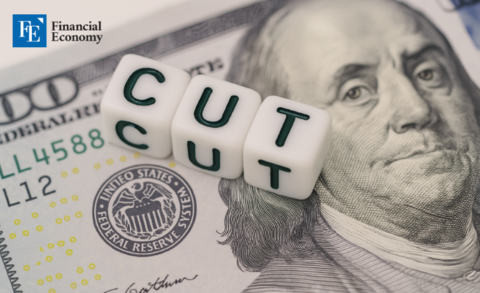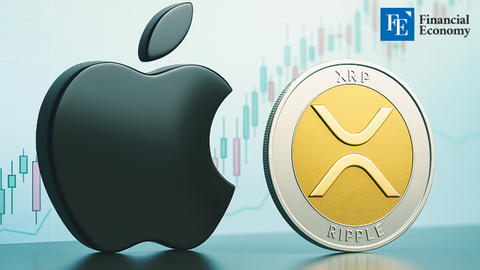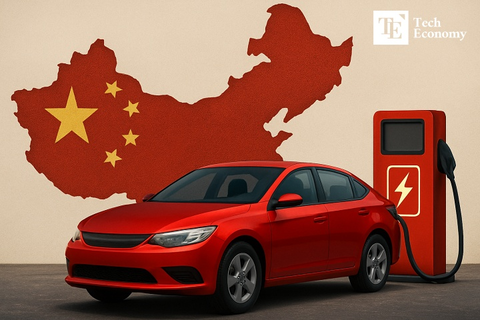Burnt Rubber and Broken Trust: The Political Unraveling of Tesla’s Brand
Input
Modified
A Target on the Hood Drivers Divided The Man Behind the Machine
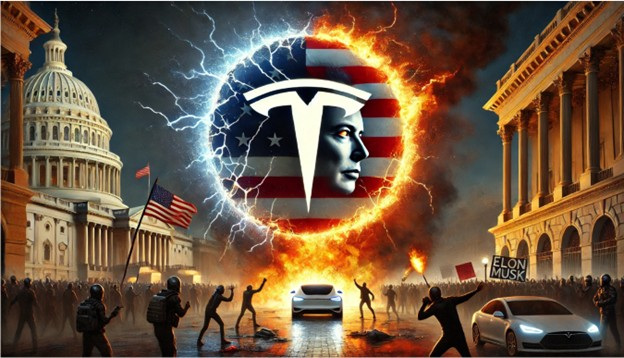
A Target on the Hood
John Newmeyer used to feel proud slipping behind the wheel of his Tesla. It wasn’t just a car; it was a statement—a sleek, green testament to progress, innovation, and a better world. But as he pulled into a San Francisco supercharging station recently, that pride had evaporated. “I am very embarrassed,” he confessed, arms folded across the hood. “He’s gone into an area he doesn’t belong in and caused a lot of damage.”
By "he," Newmeyer meant Elon Musk, Tesla’s CEO and—more controversially—President Donald Trump’s head of the newly formed Department of Government Efficiency, known as DOGE. Since taking that role, Musk has laid off more than 30,000 federal workers, gutted long-standing programs, and made himself a symbol of a radically restructured American government. In doing so, he has dragged Tesla’s image with him.
The fallout has been dramatic. In the first quarter of 2025, Tesla reported its worst performance in nearly three years, delivering just under 337,000 vehicles—a 13% drop from the year before. For a company once accustomed to year-over-year growth of up to 100%, the reversal is jarring. The EV pioneer, once a beacon of climate innovation, now finds itself battling a branding crisis of its own making.
Musk’s central role in the Trump administration, his combative online persona, and his increasingly extreme political associations have made Tesla a target—literally and figuratively. Across the U.S. and Europe, Tesla showrooms have been surrounded by protesters. The “Tesla Takedown” movement has gained traction, with Molotov cocktails hurled at a Las Vegas location, 17 vehicles torched in Rome, and over 80 Teslas vandalized in Hamilton, Ontario, in what police called the largest car sabotage case in Canadian history. Even the Vancouver International Auto Show pulled Tesla from its roster this year, citing safety concerns.
For many, the once-pristine Tesla brand has become an uncomfortable reflection of Musk himself. It’s a shift not lost on Don Flatt, a retired editor from Fredericton who bought a used Model 3 in 2024. He liked the car but didn’t want to financially support Musk. “I bought my Tesla before Elon Musk became a crazy person,” Flatt said. He’s since decided to remove the logo from the back and replace it with a magnet rearranging the letters to form words like “Steal” or “Least.”
It’s not just symbolic gestures. Data shows that more Americans are turning away from Tesla entirely. A recent Morning Consult poll found that 32% of U.S. buyers say they “would not consider” purchasing a Tesla—up from 17% just four years ago. Tesla trade-ins surged this March to what could be a record monthly high, according to Edmunds. And yet, many owners feel trapped, unable to recoup their investments in a now-controversial brand. “I already made a big purchase,” said a San Francisco driver named Mimi. “Like, I am part of why he is rich.”
The embarrassment isn’t just financial. It’s increasingly social and political. Siobhan Rodriguez, a Trader Joe’s employee who received her Tesla as a gift, said her parents are now considering selling the car. “This is not the best look for me,” she admitted. “I don’t feel safe driving in the city, because people hate him, and I hate him, too.”
In the face of this backlash, Tesla's competitors are thriving. BYD, the Chinese electric vehicle maker, outsold Tesla in Q1 with over 416,000 pure electric vehicles. The company’s latest innovation—a charging system that delivers 250 miles of range in just five minutes—makes Tesla’s previously unmatched tech look suddenly dated. And BYD’s vehicles, priced lower than Tesla’s, have a growing international appeal—especially without the political baggage.
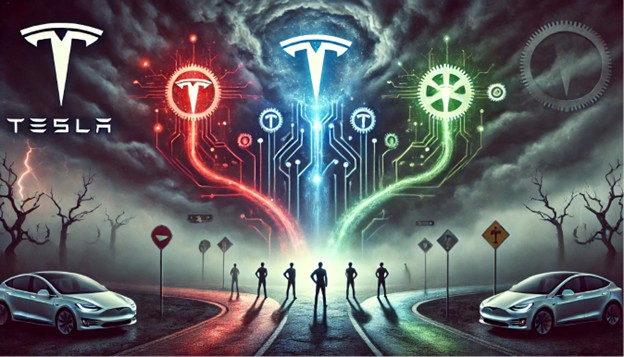
Drivers Divided
Tesla drivers are speaking out—and they're not all saying the same thing. In San Francisco, some are removing logos, applying bumper stickers that read “I bought this before Elon went crazy,” or quietly considering trade-ins. Others continue to drive their cars, albeit reluctantly, citing resale losses or the superiority of Tesla’s EV technology.
Heidi Stone, a fitness trainer, said, “There’s a level of evil there… Now you feel like you are participating.” Meanwhile, Paul Turnbull in Ottawa still owns and enjoys his Model Y but says it no longer gives him the pride it once did. “Given the current stigma against Elon, it’s not the same.”
And yet, some defend the car on practical grounds. Healthcare worker Natalie Chernysh stood by her Tesla, “Penny,” noting, “No other car has full self-driving or the reputation of this car. Nothing is black and white.” Others like April Janchoi, a tech worker, said she didn’t want to support Musk but needed the car’s features for her 50-mile commute.
But the fear is palpable. Curtis Cassels, an Uber driver, recalled passing an anti-Tesla protest outside a showroom and feeling for the first time that his car had made him a target. “There’s such a connection between the two of them,” he said. “I and the car have nothing to do with it.”
Despite all this, there remain loyalists. Entrepreneur Julian Goduci called Musk “our Einstein, our Edison” and praised his leadership at DOGE. For him, Tesla is more than just a product—it’s a revolution. “It’s like Christmas morning every morning,” he beamed. But such sentiments are now rare. Even those trying to remain neutral find it hard. Chemist Cameron Noland called Musk a “sociopath,” but said he continues to drive his Tesla because other automakers like Ford are “just as evil.” “Politics doesn’t matter as much as build quality,” he shrugged. Creative director Chase Johns had his Tesla broken into on Valentine’s Day and worries it was targeted because of the brand. “I don’t want to be seen as a Nazi supporter,” he said. “It’s unfortunate.”
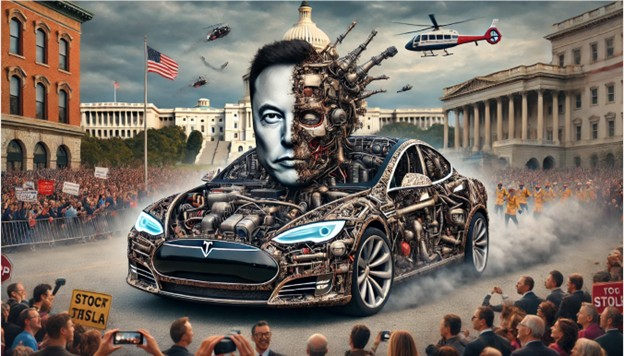
The Man Behind the Machine
Central to Tesla’s current predicament is Elon Musk himself. His role in the Trump administration and his leadership of DOGE have fundamentally rebranded Tesla for many Americans—not as a climate solution, but as a political weapon. And as polls reflect a growing distaste for Musk, Tesla’s public image continues to erode.
CNN reports that 53% of Americans view Musk unfavorably. In “blue states,” repeat Tesla purchases are down significantly, while in “red states,” loyalty is flat. In Europe, where Musk’s support for far-right parties like Germany’s AfD has drawn condemnation, Tesla sales fell 45% in January 2025 alone.
Yet Musk remains defiant. In a recent Fox News interview, he claimed, “Tesla is a peaceful company. I’ve never done anything harmful.” President Trump, too, has rallied behind him, calling vandalism against Teslas “domestic terrorism.”
But the market tells a different story. Tesla’s stock is down more than 25% since January. The company’s share price has dropped nearly $100 since Trump took office. Public pension fund managers are beginning to sound alarms, and in New York City, officials are exploring legal action after losing $300 million on Tesla stock.
And still, some Tesla owners just don’t care. “At the end of the day, it’s just a hellhole,” said Azja Walker, a mom watching TV with her kids on the Tesla’s center console. “We’re fucked regardless.” Sal Sanchez, another owner, dismissed Musk’s behavior, saying, “He says things that are inappropriate sometimes. But then again, I have also—so who am I to have an opinion?”
Tesla is expected to release its full Q1 earnings report on April 22. The numbers may offer clarity on Tesla’s financial standing, but they’re unlikely to solve the brand’s deeper identity crisis. This is no longer just about range, speed, or self-driving capability. Tesla has become a cultural touchpoint, and not everyone wants to be part of the conversation.
Whether the company can untangle its future from Elon Musk’s shadow remains uncertain. But for now, Tesla drivers find themselves navigating more than roads—they’re steering through a storm of politics, reputation, and regret.






